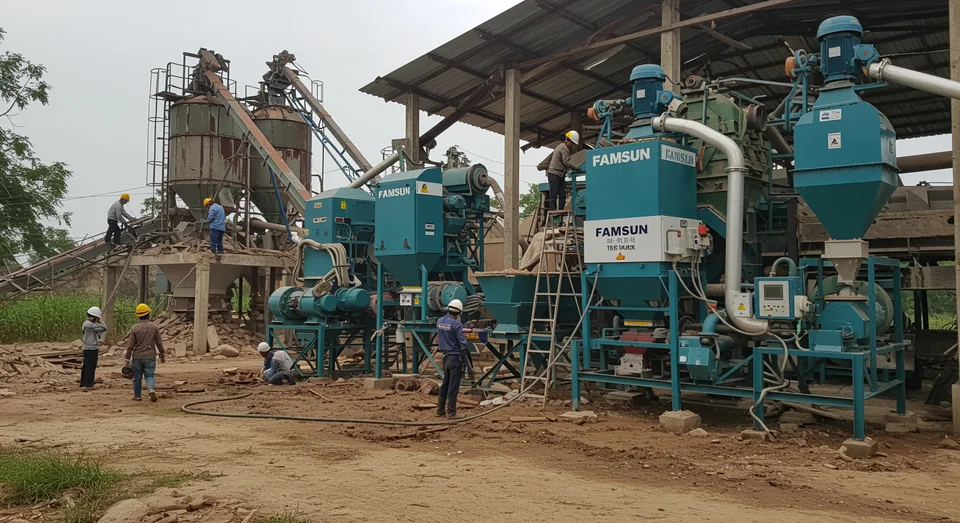FAMSUN Leads Rapid Recovery of Myanmars Agricultural Sector After Devastating Earthquake
25 views
Following a devastating 7.7-magnitude earthquake that struck Myanmar's Mandalay region on March 28, 2025, the agricultural sector faced a crisis of unprecedented proportions. With feed mills crippled and livestock feed supplies disrupted, the ripple effects threatened the nation's food security, imperiling the availability of meat, eggs, and dairy for millions. In response, FAMSUN, a global leader in agricultural solutions, initiated an urgent cross-border intervention to stabilize the situation, showcasing both technical prowess and humanitarian resolve.
A Lifeline Amid Ruins: FAMSUN's Swift Response in Myanmar
The earthquake left scars not only on the landscape but also on the critical infrastructure that sustains Myanmar's agricultural backbone. Feed mills—essential hubs in the production of livestock feed—suffered extensive damage, halting operations and jeopardizing the supply chain that supports farmers and consumers alike. Recognizing the urgency, FAMSUN mobilized a Joint Support Team within 24 hours, assembling a cadre of technical experts equipped to confront the logistical and operational challenges posed by the disaster.

The team's arrival in Mandalay marked the beginning of a remarkable turnaround. Working against the clock, FAMSUN’s engineers conducted rigorous safety inspections to assess structural integrity and operational viability at four major feed mills. Repairs were executed with precision, leveraging innovative solutions to restore stable production within a mere 48 hours—a feat that underscored the company’s technical expertise and commitment to swift action. Recommendations for safer and more resilient operations were also provided, reflecting a forward-looking approach that sought to mitigate risks in the event of future calamities.
Yet FAMSUN's response extended far beyond technical repairs. The company demonstrated a deep understanding of the human toll exacted by the disaster, delivering humanitarian aid valued at over 40 million Myanmar Kyat in collaboration with local partners. Essential supplies, including medicine, food, and water, were distributed to affected communities, offering a lifeline to those grappling with the immediate aftermath. This dual focus on infrastructure recovery and community support highlighted a holistic approach to disaster response—one that prioritized both the restoration of livelihoods and the preservation of dignity.
The significance of FAMSUN's intervention cannot be overstated. In a country where agriculture forms the bedrock of the economy, disruptions to feed production have cascading effects, threatening not only farmers but also consumers who rely on affordable protein sources. By rapidly stabilizing operations at key feed mills, FAMSUN played a pivotal role in averting a deeper crisis, ensuring that livestock feed remained available and accessible. This, in turn, safeguarded the production of meat, eggs, and dairy, alleviating fears of widespread food shortages.
FAMSUN’s ongoing recovery mission further underscores its dedication to sustainable agricultural development across Southeast Asia. Technical support and inspections continue at additional sites, with the goal of fortifying Myanmar’s agricultural infrastructure against future shocks. This long-term perspective aligns with the company’s broader vision of fostering resilience and innovation within the sector—a vision that resonates deeply in a region increasingly vulnerable to climate-related and seismic events.
The Mandalay earthquake serves as a stark reminder of the fragility of agricultural systems in the face of natural disasters. For Myanmar, the event has illuminated the critical need for investment in resilient infrastructure and disaster preparedness. While FAMSUN’s rapid response provides a model of effective intervention, it also raises pressing questions about the sustainability of current practices and the measures needed to safeguard food security in the years ahead.
At its core, FAMSUN's actions reflect a profound understanding of the interconnectedness of agriculture, community well-being, and economic stability. By stepping in at a moment of crisis, the company has not only restored vital operations but also reaffirmed the importance of collaboration and innovation in addressing global challenges. As Myanmar continues its journey toward recovery, the lessons from Mandalay will undoubtedly shape the future of agricultural development in the region, offering hope and inspiration in the face of adversity.